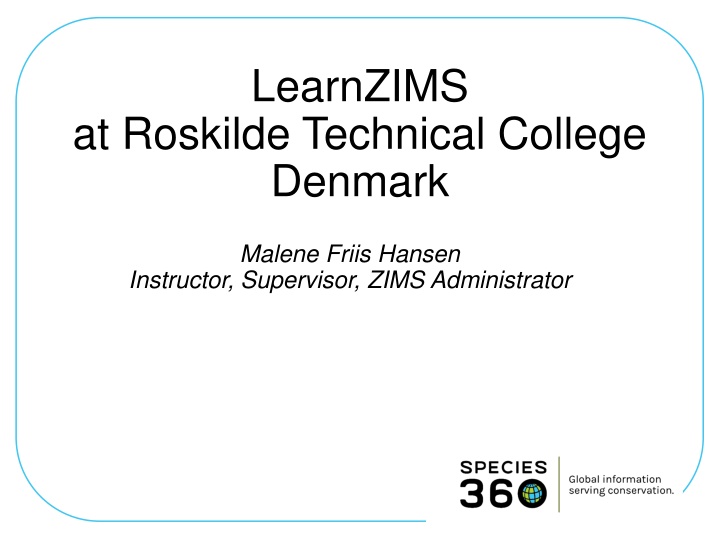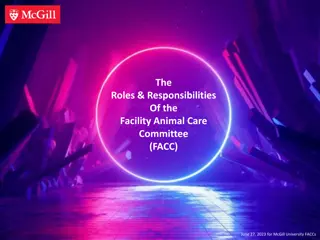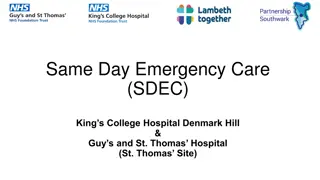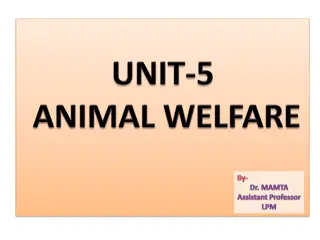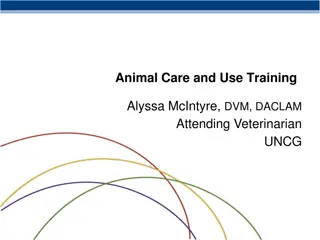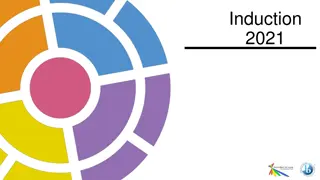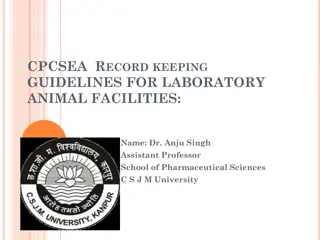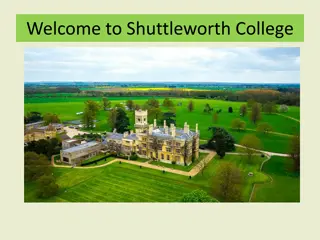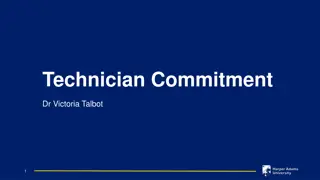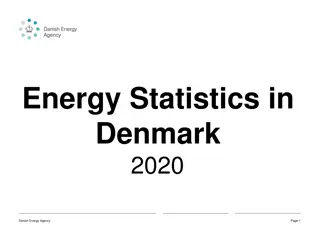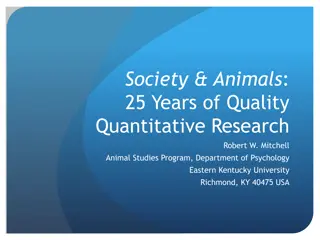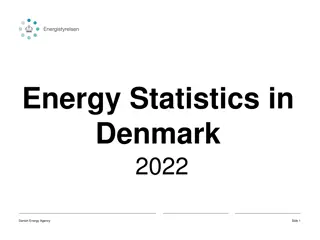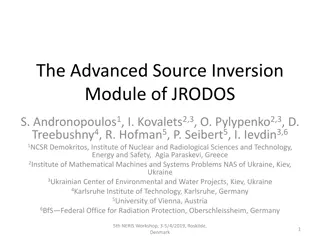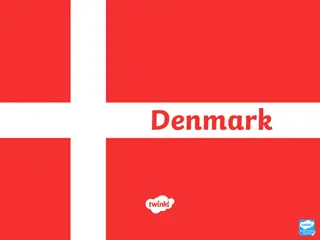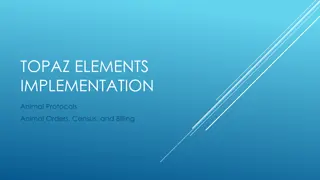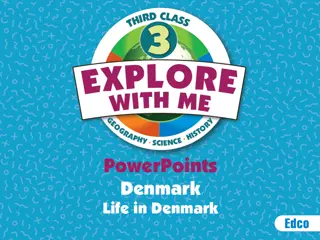Animal Care Education at Roskilde Technical College, Denmark
Roskilde Technical College in Denmark offers comprehensive education in animal care, specializing in experimental animals, horses, and zoo/aquaria. The program includes formal education and extensive on-the-job training to prepare students for diverse roles as animal keepers. Students are taught a wide range of subjects related to professional animal care, ensuring they are well-equipped for the industry. The college aims to stay current with industry trends to provide high-quality education.
Download Presentation

Please find below an Image/Link to download the presentation.
The content on the website is provided AS IS for your information and personal use only. It may not be sold, licensed, or shared on other websites without obtaining consent from the author.If you encounter any issues during the download, it is possible that the publisher has removed the file from their server.
You are allowed to download the files provided on this website for personal or commercial use, subject to the condition that they are used lawfully. All files are the property of their respective owners.
The content on the website is provided AS IS for your information and personal use only. It may not be sold, licensed, or shared on other websites without obtaining consent from the author.
E N D
Presentation Transcript
LearnZIMS at Roskilde Technical College Denmark Malene Friis Hansen Instructor, Supervisor, ZIMS Administrator
Today A presentation of our college Our use of LearnZIMS Why we are teaching ZIMS The outcome so far Ideas for collaboration
Denmark Educates students within all fields of plant and animal care
The education of animal keepers The education consists of 2 parts: 1.Basic Course 2.Main Course: Step 1: no specialization, animal keeper assistant. Step 2: specialising in Experimental animals, Horses or Zoo/Aquaria animals The structure of the education Basic course Main course Step 1 Step 2 Possibly on-the-job training School period 20 weeks On-the-job training School period 10 weeks On-the- job training School period 6 weeks School period 6 weeks On-the-job training School period 10 weeks On-the-job training Total: 52 weeks formal education and training (College) and 138 weeks on-the-job training (Lab/Stable/Zoo)
Specialisations Experimental animals : Husbandry of experimental animals Animal keeper Experimental animals Animal keeper Laboratory techniques Experimental animals Horses: Husbandry of horses Horse stable technique Animal keeper Horses Zoo: Husbandry of animals in Zoos and Aquaria Zoo/Aquarium technique Animal keeper Zoos/Aquaria
Zoo/Aquaria Keeping students Zoo/Aq.keeper Profile: 25-30 years old International experience Committed Hard-working Eager to learn Previous education in other fields
Subjects Students are taught all subjects relevant to professional animal care in all fields of animal care: Animal behaviour, welfare, nutrition, wildlife conservation, environmental education etc.
We aim We aim to always keep ourselves up to date, and ensure the students are well equipped for the animal care industry So now ZIMS!
ZIMS at RTS Many animal facilities register animal data in ZIMS It is a general aim to have keepers enter daily observations, training, enrichment and feeding data in ZIMS not just scientific staff We wish to prepare our keeper students for this, and professionals in the industry who has not been trained in using ZIMS
ZIMS at RTS Species360 Membership to be able to register our own animals, stay connected with zoos and aquaria nationally and internationally, increase communication. LearnZIMS license Teach ZIMS to Animal Keeping students Have courses on ZIMS for staff from zoos and aquaria
Certificates We provide an Species360 approved certificate for all who finishes the course
ZIMS for students The students are taught everything necessary for the daily use of ZIMS They are also taught how to add new animals, enclosures, life support and components. They are taught how to understand the user surface, how to search for data, create graphs Everything that can ease the daily work of the keeper and increase the welfare of the animals
ZIMS for professionals We are having our first course for professional from various zoos and aquaria in November, 3rd-7th 2014. They will be taught the same as the keepers, learning how to use it for daily registration. However assignments will be created to suit their individual needs.
ZIMS for professionals We will begin with having courses mostly aimed at animal keepers and technicians However we do wish to also have courses for zoologist/curators/registrars and possibly vets later on Our first course will be in Danish, yet courses in English will follow soon if there is a demand
A brief overview of using LearnZIMS my institution
Adding students/participants They are added as normal employees, given a password and removed when finished
Role access I manage it to ensure they are able to finish their assignments
Introduction The students are given an introduction to ZIMS where they learn to recognize the different features and understand how it generally works They follow my lead on their own computers
An assignment example Team setup Goal presentation to use ZIMS as keepers for example Create own institution At least one species per person, Attach enclosure and life support as well components, Register feeding logs, training logs, weights and measurements for environmental factors and life support for the last 10 days Create graphs of your data Transfer the data to excel Create a presentation for your fellow classmates explaining your institution and your choices
The use of LearnZIMS Students are given a lot of time and many assignments to really practice their skills I can follow their every move in Transaction Monitoring One problem is that I give them access to everything, this also means that they do mess with each other and erase each others animals .
The use of LearnZIMS So far has been great The students feel relaxed knowing it is ok to make a mistake The way of teaching it with many tasks and assignments seem to enable a fast and strong knowledge of the program Students have gone back to their apprenticeships and explained ZIMS to their managers
Bonus Taxonomy Learning about it Finding species Learning how to find all information when using ZIMS Learning a holistic approach to animal keeping; measurements, observations etc.
Only minus That the students cant find real data I do not let them use ZIMS, even if its just for searching due to the privacy of the institutions. It could be great if this was possible
All in all It is going very well. We have a lot of people contacting us regarding ZIMS We hope this first course for professionals will be filled and more will come All students graduating from us in Animal Care specialising in Zoos/Aquaria will have a ZIMS certificate Newly graduated keepers have already been hired due to this
Thank you Thank you for listening Never hesitate to contact me: Malene: mafh@rts.dk +45 60142757
